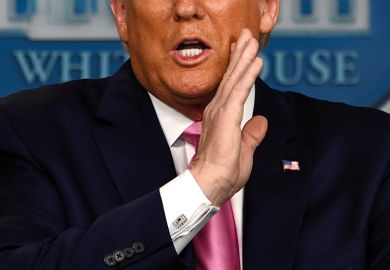A defining characteristic of the Covid-19 pandemic is the uneven way in which its impact has been felt.
That inconsistency can be seen at almost every level: from the health impact on individuals based on age, weight, ethnicity or occupation, to the way in which governments have responded.
Ultimately, it is seen in hugely differentiated death rates, from the successes of countries such as South Korea and Hong Kong, to the terrible toll inflicted in the US and the UK.
There will be a range of impacts on and responses from universities, too, and in the past week institutions have begun to declare their longer-term adjustments to the crisis.
The University of Cambridge showed its hand early, as the highest-profile university to announce that all lectures would remain online-only for the 2020-21 academic year. In a less widely reported announcement, the University of Bolton set out plans to restart in-person teaching in the autumn term.
It is clear that the impact of this pandemic on teaching and learning, and the wider student experience, is going to be longer-term than might have been hoped, and also that – barring some sudden outbreak of consensus or directive – the response will vary from place to place.
This is also likely to be true of the impact of the Covid-19 crisis on academic jobs, and in our news pages this week, we consider the factors that will determine how much pain might be inflicted.
A key consideration is the nature of the university system itself – where the money comes from, and the extent to which market forces dominate.
It was striking, early in the UK’s response, to hear the education secretary, Gavin Williamson, warning that the loss of overseas students could spark an “unseemly scramble” for domestic applicants.
He was right – universities will be seeking to maintain revenues in whatever way possible given the funding black hole caused by the evaporation of overseas student fees, and an interim control on student numbers makes sense – but it was nevertheless a startling change of tone from a Conservative government that has spent years trying to ramp up competition in England. How things change.
In our news analysis, we take a detailed audit of university systems around the world, assessing how reliant each is on international student fees to pay staff salaries.
Systems such as Australia, the UK and the US are in a very different position from those countries with less marketised approaches, and the result is that university staff in the Netherlands and Germany, for example, have more protection from the immediate economic impact.
Of course, it is worth reflecting on the background to the move to marketisation.
In England, it dates largely from the financial crash a decade ago, when higher tuition fees and growth in international student numbers helped universities to maintain funding as austerity bit.
And as is pointed out in our news story by Peter-Andre Alt, president of the German Rectors’ Conference, state-funded systems are not entirely sheltered from the economic storm.
“In the end, there will be downgraded public investment in higher education and culture,” he predicts, pointing to the huge debts taken on by German states to weather the pandemic.
Another significant factor for university finances is how global geopolitical fault lines are affected by the crisis – with US universities watching Donald Trump’s sabre rattling with justified concern.
Not only will tensions between the US and China affect undergraduate student flows, they will also hit postgraduates, who in some areas of science and engineering keep courses and research viable.
The Presidents’ Alliance on Higher Education and Immigration, representing 450 institutions, has warned that the combined effect could be a $10 billion (£8.2 billion) hit to university finances, threatening jobs and scientific capacity, “including research related to responding to and preventing pandemics”.
The stakes in getting the response right really could not be higher, but the question many countries are asking is whether their government is up to the job.
So as a final recommendation this week, do spend some time with our cover story, in which we hear from the leaders of schools of government in the US, and present an in-depth analysis by Karthik Ramanna, director of the master of public policy programme at the Blavatnik School of Government, University of Oxford, about how his programme is attempting to improve government around the world.
The Covid-19 crisis has shown how pressing a task that is.
后记
Print headline: The first steps back


